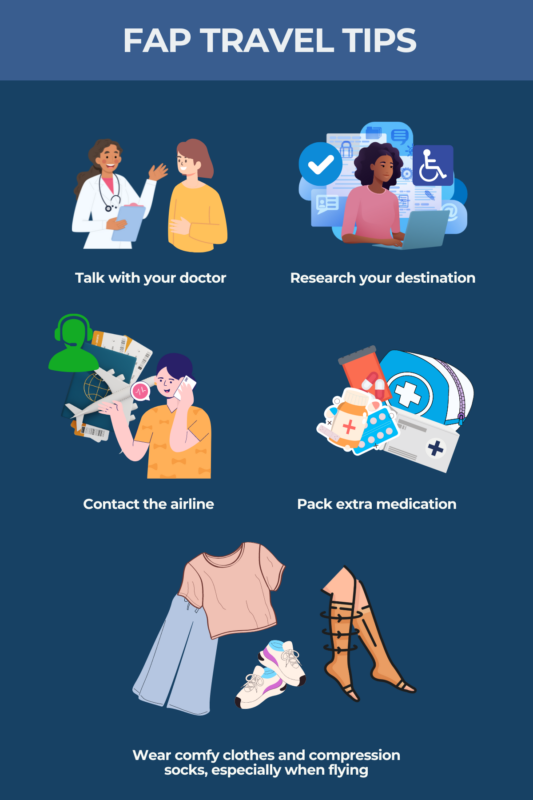FAP travel tips
Last updated Sept. 9, 2024, by Philo Uwamaria

Managing familial amyloid polyneuropathy (FAP) symptoms, such as numbness and tingling in the hands and feet and gastrointestinal issues, can be challenging, especially when exploring unfamiliar places.
While it’s a good idea to travel with a caregiver or companion who is familiar with FAP and knows how to assist in an emergency, following these familial amyloid polyneuropathy travel tips can help you stay safe and comfortable wherever your journey may take you.
Speak with your doctor
Schedule an appointment with your doctor to discuss familial amyloid polyneuropathy travel and how to manage your condition away from home. They should be able to advise you on adjusting FAP treatment, including the best way to accommodate time zone changes, as well as address other related questions.
- Request a written summary of your medical needs in case you require care while away.
- Get advice on managing fatigue, digestive issues, and neuropathy pain when traveling, especially in hot or high-altitude destinations.
- Discuss appropriate excursions and activities at your destination.
- Check on any needed vaccinations at least 4 to 6 weeks before your trip. Keep in mind vaccines can sometimes interact with your regular FAP treatment.
- Bring up any concerns about your diet and sleep schedule.
- Ask for referrals to local hospitals in case of an emergency.
Research your destination
Before you depart, research your travel destination so you know what to expect and are prepared for the unexpected, especially if your trip involves international travel.
- Look into healthcare facilities and services in the area you’ll be visiting and find out if any of them has experience treating FAP or similar conditions.
- Call your health insurance to find out which hospitals and urgent care facilities at your destination accept your insurance and offer emergency services.
- Research the climate and geography. High altitudes or hills may make it difficult to get around. Extreme heat or cold can exacerbate FAP symptoms such as peripheral neuropathy, so plan your activities and packing accordingly.
- Look into transportation options to ensure you can easily get around.
- If you plan to go on tours or visit museums, check accessibility and how much physical exertion is required.
- When booking a room, call the hotel directly to guarantee an accessible room. Ask about specifics, such as dimensions of the room, width of the doorways, and if the bathrooms have roll-in showers and grab bars.
- Look into travel insurance and what it will cover for the destination.
Plan your FAP treatment regimen
Even with the best preparations, health issues can arise. Double check that you’ve packed enough medication for your entire trip, plus an extra few days. Delays are more common, and prescription refills may not be accepted internationally.
Always have with you information about your condition, medications, and emergency contacts.
- Carry enough medication in your carry-on bag to last at least a few days in case checked luggage is lost or delayed.
- Ask your doctor for extra prescriptions as backup.
- Bring medication inserts or details about your prescription in case you have issues at security or customs checkpoints.
- Wear medical alert jewelry to identify your condition in an emergency.
- When traveling internationally, check if prescriptions are accepted and how to get refills.
- Get a doctor’s note if you need to take syringes, ice packs, or other medical supplies with you. Plan for temperature-controlled storage if required.
- Bring a folding wheelchair or cane, if needed.
- Include extras such as batteries, labeled chargers, and antibacterial wipes.

Pack your travel essentials
In addition to medication and assistive equipment, you may also want to bring:
- a travel kit with compression socks or stockings, gauze, wipes, and pain medication
- neck and back pillows
- heating pads, ice packs, and anything else that provides relief.
Everything should be accessible and easy to find so you can use them whenever symptoms appear. Most important, carry documentation from your doctor about your condition, FAP treatment plan, and equipment in case you need medical care while traveling, and to show to airport security or border control in case they have questions about devices, medications, and mobility aids.
Contact the airline
Let the airline know about your FAP diagnosis and request any necessary accommodations, such as aisle seats and seats with extra legroom.
- Double check if the airline has restrictions for carrying on syringes, needles, and liquid medication. Request early boarding for passengers with medical conditions or disabilities.
- Ask if the airline has its own medical clearance or travel letter form and when it needs to be submitted.
- Inquire about wheelchair assistance, if needed, for navigating the airport. Since wheelchairs can be damaged during air travel, check the airline’s disability policy and prepare your chair for secure storage.
Unfortunately, disability requests can sometimes get lost or miscommunicated, so follow up on your requests to confirm they’ve been received.
Manage your symptoms while traveling
When traveling, especially flying, wear loose, comfortable clothing and compression socks, unless your doctor has said otherwise. Air pressure change inside the plane cabin can cause fluid buildup in your legs and feet.
Carry on you:
- pain relievers
- anti-nausea meds
- medical alert bracelets or cards with your condition and emergency contacts.
Sitting motionless for extended periods can cause neuropathy symptoms to flare up, leaving your legs tingling or painful. If possible, move around whenever you can. Do some simple leg stretches in your seat or walk up and down the aisle.
If traveling by car, schedule stops every hour or two for standing and light stretching.
As FAP affects your peripheral nervous system, be careful walking on uneven ground or slippery surfaces. You might want to bring a cane or walker even if you don’t usually use one.
Useful resources for your trip
The right travel resources and preparation can help ensure your trip goes smoothly.
FAP News Today columnists share advice about living with FAP, including columnist Ezekiel Lim who discusses how to manage neuropathy while traveling.
If you are having issues with mobility, you can search for accessible accommodations on Airbnb, Vrbo, and TripAdvisor.
Check if there are any FAP organizations or support groups in the area you’re visiting that can suggest local healthcare providers familiar with FAP.
FAP News Today is strictly a news and information website about the disease. It does not provide medical advice, diagnosis, or treatment. This content is not intended to be a substitute for professional medical advice, diagnosis, or treatment. Always seek the advice of your physician or other qualified health provider with any questions you may have regarding a medical condition. Never disregard professional medical advice or delay in seeking it because of something you have read on this website.
Recent Posts
Related articles






